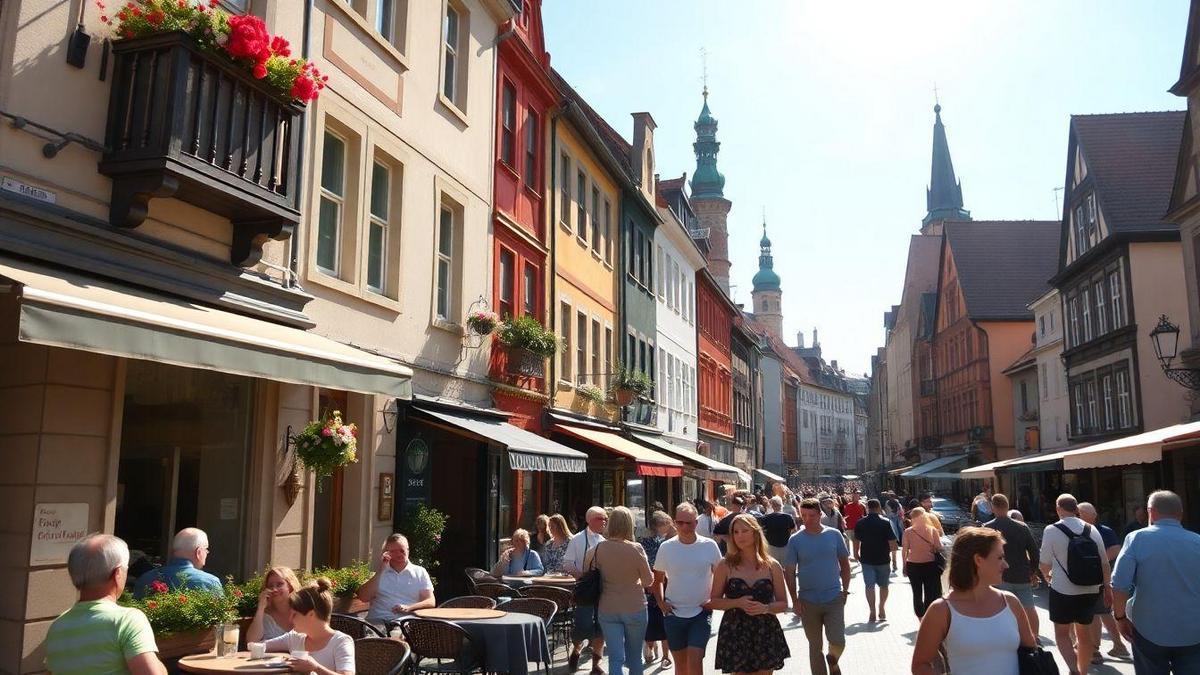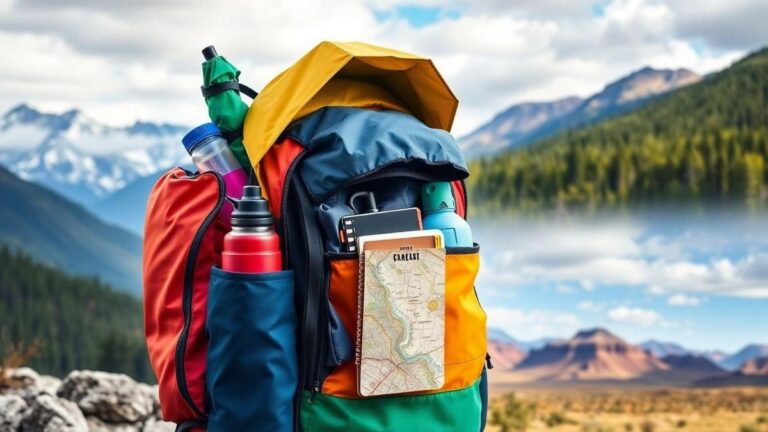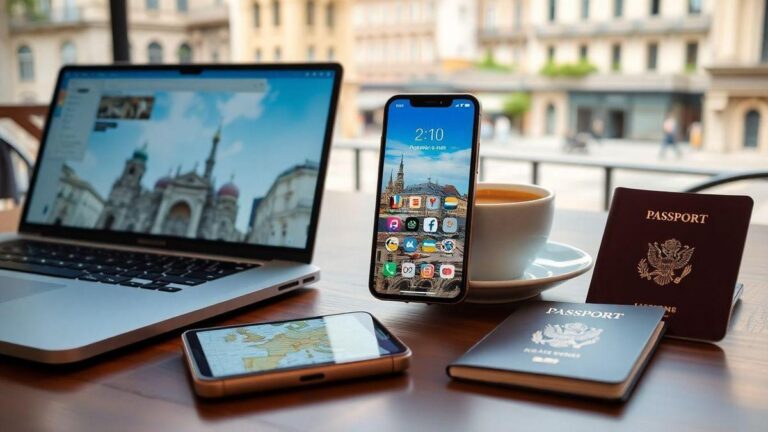Effective German language skills for European travel
Effective German language skills for European travel can make your adventures in German-speaking countries much richer. Imagine being able to navigate through bustling cities, order delicious local dishes, and connect with friendly locals just by knowing some basic phrases. In this article, you’ll discover fun and easy ways to learn essential travel phrases, practice your German skills, and understand important cultural tips. So, get ready to dive into the world of German language and culture that will enhance your travel experience!
Important Takeaways
- Knowing German helps you connect with locals.
- It makes travel more enjoyable and fun.
- You can easily ask for help when needed.
- Reading signs and menus is simpler.
- Learning a few phrases boosts your confidence.
Mastering Basic German Phrases for Tourists
Essential Travel Phrases in German
When you travel to Germany, knowing a few basic phrases can make your trip much smoother. Here are some essential phrases you should learn:
| English Phrase | German Phrase |
|---|---|
| Hello | Hallo |
| Thank you | Danke |
| Please | Bitte |
| Yes | Ja |
| No | Nein |
| Excuse me | Entschuldigung |
| How much is this? | Wie viel kostet das? |
| Where is…? | Wo ist…? |
| I don’t understand | Ich verstehe nicht |
| Can you help me? | Können Sie mir helfen? |
These phrases can help you navigate various situations, from ordering food to asking for directions.
How to Use Basic German for Effective Communication
Using these phrases is all about confidence. Don’t be shy! When you greet someone with a friendly “Hallo,” it opens doors. If you need help, say “Können Sie mir helfen?” and watch how people respond. Most Germans appreciate when you try to speak their language, even if it’s just a few words.
Here are some tips for using these phrases effectively:
- Practice Pronunciation: Say the phrases out loud. It helps you remember them better.
- Use Gestures: Sometimes, actions speak louder than words. Point to items if you’re unsure.
- Be Polite: Always add Bitte when asking for something. It shows respect.
Tips for Practicing Your German Phrases
Learning a new language can feel like climbing a mountain. But with these tips, you’ll feel like you’re gliding down the slopes!
- Daily Practice: Try to use one or two phrases every day. This keeps them fresh in your mind.
- Language Apps: Use apps like Duolingo or Babbel. They make learning fun and interactive.
- Speak with Locals: If you have German friends or meet locals, practice with them. They can give you tips and correct your pronunciation.
- Watch German Movies: Listening to the language helps you catch the rhythm and flow. Plus, it’s entertaining!
Enhancing Your German Vocabulary for Travel
Key German Vocabulary Words for Travelers
When you’re traveling to Germany, having a few key words under your belt can make a world of difference. Here’s a handy list of essential German vocabulary that will help you get around and connect with locals:
| English | German |
|---|---|
| Hello | Hallo |
| Thank you | Danke |
| Please | Bitte |
| Yes | Ja |
| No | Nein |
| Excuse me | Entschuldigung |
| Where is…? | Wo ist…? |
| How much? | Wie viel? |
These words can help you in various situations, whether you’re ordering food or asking for directions. Knowing these simple phrases can make your trip more enjoyable and stress-free.
Building Your German Language Skills for European Adventures
To really get the most out of your travels, consider diving a little deeper into the German language. Here are some tips to build your skills:
- Practice Daily: Try to learn a few new words each day. Use apps like Duolingo or Babbel.
- Watch German Movies: This can help you get used to the sounds and rhythm of the language.
- Join a Language Group: Find a local group or online community where you can practice speaking.
- Use Flashcards: Write down words you want to remember and quiz yourself regularly.
These methods can help you develop effective German language skills for European travel. The more you practice, the more confident you’ll feel.
Fun Ways to Learn German Words Before You Go
Learning a language doesn’t have to be boring! Here are some fun ways to pick up German words before your trip:
- Sing Along: Find German songs you like and sing along. It’s a great way to remember words.
- Label Your Home: Put sticky notes on items around your house with their German names. This helps reinforce your memory.
- Play Games: Use language learning games or apps that make learning feel like play.
- Cook German Recipes: Try out some German dishes and learn the names of ingredients in German.
These engaging methods can help you learn while having a blast! Plus, you’ll be ready to impress locals with your newfound vocabulary.
Cultural Tips for Navigating German-Speaking Countries
Understanding German Customs and Etiquette
When you travel to German-speaking countries like Germany, Austria, or Switzerland, knowing local customs can make a significant difference. Here are some key points to keep in mind:
- Punctuality: Being on time is very important. If you have a meeting or a dinner, aim to arrive at least a few minutes early.
- Greetings: A firm handshake is the norm when meeting someone. Don’t forget to make eye contact, too!
- Dining Etiquette: Wait for the host to start eating before you dig in. Saying “Guten Appetit!” before meals is a nice touch.
- Respect Personal Space: Germans value their personal space. Keep a comfortable distance when talking to someone.
These simple tips can help you blend in and show respect for the culture.
How Language Skills Enhance Your Travel Experience
Having effective German language skills for European travel can truly enrich your journey. Imagine walking into a café and ordering your coffee in German. The smile on the barista’s face will be worth it! Here’s how your language skills can help:
- Better Communication: You can ask for directions or recommendations without relying on a translator.
- Making Friends: Speaking the local language opens doors to friendships. You can connect with locals on a deeper level.
- Cultural Insights: Understanding the language helps you grasp cultural nuances that you might miss otherwise.
In short, the more you practice, the more you’ll enjoy your travels!
Making Connections Through Language and Culture
When you learn German, you unlock a treasure trove of connections. Here’s how language and culture go hand in hand:
| Language Skill | Cultural Benefit |
|---|---|
| Speaking | Builds trust and rapport |
| Listening | Shows respect and interest |
| Reading | Opens up literature and history |
| Writing | Enables personal expression |
By diving into the language, you not only learn words but also the stories behind them. You’ll find that the locals appreciate your effort, making your trip even more memorable!
Frequently Asked Questions
Why are Effective German language skills for European travel important?
Effective German language skills for European travel help you connect with locals. You can ask for directions, order food, and understand signs. This makes your trip smoother and more enjoyable.
How can I improve my German language skills quickly?
Practice speaking daily. Use language apps, watch German videos, or listen to music. You can also join a local class or find a language buddy to chat with.
Do I need to be fluent in German for traveling in Germany?
No, you don’t need to be fluent. Basic phrases will get you far. Focus on greetings, common questions, and polite expressions.
What are some essential German phrases for travelers?
Here are some must-know phrases:
– Hallo (Hello)
– Danke (Thank you)
– Entschuldigung (Excuse me)
– Sprechen Sie Englisch? (Do you speak English?)
Learn these to enhance your travel experience!
Can I travel in Germany without knowing German?
Yes, you can! Many Germans speak English. However, having effective German language skills for European travel will help, especially in smaller towns. Plus, it shows respect to their culture!

Hey, I’m Paula — traveler, language nerd, and the curious mind behind znewz.com. I’ve always believed that real connections happen through words, gestures, and shared experiences — not algorithms. That’s why I created this blog: to share travel stories from around the world and explore how language helps us connect in ways that AI still can’t. Whether I’m getting lost in a tiny town or striking up a chat in a language I barely know, I’m here to show that sometimes the best moments happen when tech takes a back seat.





